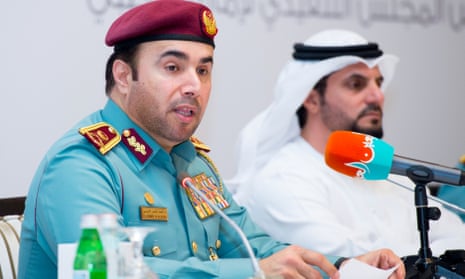Two British men formerly detained in United Arab Emirates are campaigning to prevent a senior Emirati official from becoming the next president of Interpol, accusing him of personal involvement in their arrests and torture.
Academic Matthew Hedges, who was imprisoned in the UAE for seven months, and football fan Ali Issa Ahmad, detained while on holiday in Dubai for wearing a Qatar football shirt, accuse Major General Ahmed Naser Al-Raisi of overseeing their detention and physical abuse.
“I have personally suffered torture and abuse under his command,” said Ahmad, adding that he still bears visible scars from the abuse he endured.
Al-Raisi, one of just two candidates to declare their intention to become Interpol’s president, is the longstanding inspector general of the Emirati interior ministry. “He has a supervisory role over prisons, including those who have committed acts of torture, such as guards and interrogators. This all happened on his watch. Interpol can’t countenance this. They can’t say this is good enough – they must call it out,” said Rodney Dixon QC, who is representing Hedges and Ahmad.
“He is absolutely responsible for torture. The message his candidacy sends is that not only can you do this and get away with it, but be rewarded,” said Hedges, who was eventually pardoned after accusations of espionage.
The International Criminal Police Organization, or Interpol, is a supranational police force that provides investigational support to member states, including sharing information on suspects. While the position of president, to be decided at the annual general assembly in Istanbul this week, is unpaid, it still wields considerable influence. A band of international critics have expressed concern that Al-Raisi’s election could jeopardise Interpol’s neutrality, while providing international approval towards abuses committed within the Emirati justice system.
Al-Raisi has taken a very public approach to his candidacy despite a normally opaque election process. He conducted an extensive global tour to lobby for the position, while a website set up to list his achievements boasts that he modernised the Emirates police force, and created the interior ministry’s “general directorate of happiness.”
“He is an inappropriate candidate,” said Hedges. “[His election] would green-light and legitimise the behaviour of actors and states that abuse not only Interpol and its prestige, but international justice and policing.”
Al-Raisi is the target of multiple lawsuits in the UK, Sweden, Norway and France, where Interpol is based. Hedges and Ahmad are expected to file a lawsuit against Al-Raisi in Turkey before the general assembly.
Their human rights claims are accompanied in France by a lawsuit filed by the Gulf Centre for Human Rights, who accuse him of “acts of inhumanity and torture”, regarding human rights activist Ahmed Mansoor, held in solitary confinement in the UAE for four years. The lawsuits could hinder Al-Raisi’s ability to move freely if elected, because Interpol is headquartered in Lyon. “If he sets foot on French territory, he could be arrested and investigated for torture under the principle of universal jurisdiction,” said Dixon.
The report also pointed to a €50 million donation from the UAE to Interpol’s Foundation for a Safer World, the single largest donation to Interpol or its sister foundation in recent years. It expressed concern that a donation of this magnitude could prejudice the institution in the Emirates’ favour.
An Interpol spokesperson dismissed the report’s findings. “Any claim that the UAE, or indeed any country or organisation has undue influence in relation to any policy, budget or operational decisions by the InterpolNTERPOL General Secretariat headquarters due to financial considerations is categorically false,” they said.
Interpol also declined to comment on Al-Raisi’s bid for the presidency. “It is for each member country to ensure it is informed about each candidate, ... to assess and elect the individual it believes can best meet the responsibilities of the president,” they said.president,” they added.
A spokesperson for the UAE embassy in London said: “Major General Al-Raisi is a distinguished professional with a 40-year track record in community and national policing. As the President of Interpol, he will remain committed to protecting people, making communities safer and providing global law enforcement the latest tools in the fight against sophisticated criminal networks.”








